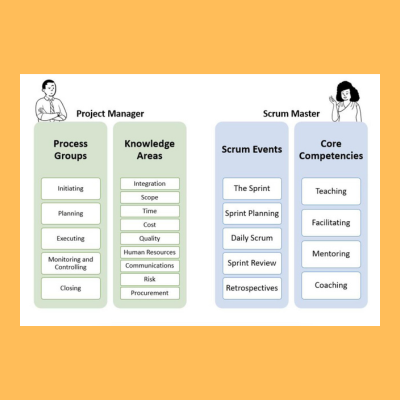Scrum Master vs Project Manager: Scrum methodology is one of the most popular Agile frameworks used in software development. Within this framework, the role of a Scrum Master and a Project Manager is crucial to the success of the project. However, many people often confuse the two roles, and it can be challenging to differentiate between them. This article aims to explain the differences between a Scrum Master and a Project Manager, their roles, responsibilities, and the skills required to excel in each position.
The Scrum Master is a servant-leader who guides the development team and ensures that they follow the Scrum framework. The Scrum Master is responsible for facilitating Scrum events, removing impediments, and ensuring that the team adheres to the Scrum values, practices, and rules. On the other hand, the Project Manager is responsible for managing the project’s scope, budget, and timeline. They are accountable for the project’s success and ensure that the project meets the stakeholders’ expectations.
In summary, understanding the differences between a Scrum Master and a Project Manager is vital to the success of a project. While both roles are essential, they have different responsibilities, skills, and objectives. The following sections will provide a more in-depth exploration of the roles and responsibilities of a Scrum Master and a Project Manager.
Key Takeaways
- A Scrum Master is responsible for facilitating Scrum events, removing impediments, and ensuring that the team adheres to the Scrum values, practices, and rules.
- A Project Manager is responsible for managing the project’s scope, budget, and timeline and ensuring that the project meets the stakeholders’ expectations.
- Understanding the differences between a Scrum Master and a Project Manager is vital to the success of a project.
Roles and Responsibilities
Scrum Master Responsibilities
The Scrum Master is responsible for ensuring that the Scrum framework is understood and followed by the team. They facilitate the Scrum events, including Sprint Planning, Daily Scrum, Sprint Review, and Sprint Retrospective. The Scrum Master also helps the team to remove any impediments that are blocking their progress and ensures that the team is working efficiently and effectively.
The Scrum Master is a servant-leader who helps the team to self-organize and make decisions. They coach the team to be more productive, and they encourage the team to continuously improve their processes. The Scrum Master is also responsible for ensuring that the team is following the Definition of Done and that the product backlog is up to date.
Project Manager Responsibilities
The Project Manager is responsible for managing the project from start to finish. They are accountable for delivering the project on time, within budget, and to the required quality. The Project Manager creates the project plan, defines the project scope, and identifies the project risks.
The Project Manager communicates with stakeholders to ensure that their needs are met, and they manage the project team to ensure that everyone is working towards the same goal. They also monitor the project progress and report on the project status to the stakeholders.
The Project Manager is responsible for managing the project budget, and they ensure that the project is delivered within the allocated budget. They also manage the project resources, including the people, equipment, and materials, to ensure that they are used efficiently.

| Scrum Master Responsibilities | Project Manager Responsibilities |
|---|---|
| Facilitate Scrum events | Create project plan |
| Remove impediments | Define project scope |
| Coach team to be more productive | Identify project risks |
| Ensure team is following Definition of Done | Communicate with stakeholders |
| Ensure product backlog is up to date | Monitor project progress |
| Manage project budget | |
| Manage project resources |
In summary, while the Scrum Master is focused on the team and ensuring that they are following the Scrum framework, the Project Manager is focused on the project as a whole and ensuring that it is delivered on time, within budget, and to the required quality.
Key Objectives
Scrum Master Objectives
The Scrum Master is responsible for ensuring that the Scrum team follows the Scrum framework. They facilitate the Scrum events, including the Daily Scrum, Sprint Review, Sprint Planning, and Sprint Retrospective. They also ensure that the team is adhering to the Scrum values of commitment, courage, focus, openness, and respect.
The Scrum Master’s primary objective is to remove any impediments that are preventing the team from achieving its Sprint goals. They work to ensure that the team has the necessary resources and support to complete their work effectively. They also help the team to continuously improve by identifying areas for improvement and implementing changes to the Scrum process.
Project Manager Objectives
The Project Manager is responsible for ensuring that the project is completed on time, within budget, and to the required quality standards. They are responsible for managing the project scope, schedule, budget, and resources. They work closely with stakeholders to ensure that their needs are met and that the project is aligned with the organization’s goals.
The Project Manager’s primary objective is to ensure that the project is completed successfully. They work to identify and manage risks and issues that could impact the project’s success. They also ensure that the project team is working effectively and that the project is progressing according to plan.
In summary, while the Scrum Master’s primary objective is to facilitate the Scrum process and help the team to continuously improve, the Project Manager’s primary objective is to ensure that the project is completed successfully. Both roles are crucial for the success of a project, and they work together to ensure that the project team is working effectively and that the project is progressing according to plan.
Leadership Style
Scrum Master Leadership
The Scrum Master is a servant-leader who empowers the team to self-organize and make decisions. The Scrum Master’s leadership style is collaborative and facilitative, focusing on removing impediments and ensuring the team has everything they need to succeed. They encourage open communication, transparency, and continuous improvement.
According to Coursera, the Scrum Master’s leadership style is based on the Agile Manifesto, which values individuals and interactions over processes and tools. The Scrum Master leads by example, demonstrating the values and principles of Scrum, such as respect, courage, and commitment.
Project Manager Leadership
The Project Manager is responsible for the overall success of the project and takes a more directive approach to leadership. They manage the project scope, schedule, budget, and resources, and ensure that the project is completed on time, within budget, and to the required quality standards.
The Project Manager’s leadership style is based on the traditional project management approach, which values planning, control, and predictability. According to Teaching Agile, the Project Manager leads by authority, making decisions and delegating tasks to team members. They focus on achieving the project objectives and meeting the stakeholders’ expectations.
In summary, the Scrum Master’s leadership style is more collaborative and facilitative, while the Project Manager’s leadership style is more directive and authoritative. Both roles are important for project success, and the leadership style should be adapted to the project’s needs and the team’s dynamics.
Scope of Work
Scrum Master Scope
The Scrum Master is responsible for ensuring that the Scrum process is implemented effectively and efficiently. They act as a coach and facilitator for the Scrum team and help them to achieve their goals. The Scrum Master is not responsible for managing the project, but rather for managing the Scrum process. They ensure that the team follows the Scrum framework, remove any impediments that may arise, and encourage the team to continuously improve.
The Scrum Master is also responsible for organizing and facilitating the Scrum events, such as Sprint Planning, Daily Scrum, Sprint Review, and Sprint Retrospective. They ensure that these events are time-boxed and that they are conducted effectively.
Project Manager Scope
The Project Manager is responsible for managing the project from start to finish. They are responsible for ensuring that the project is completed within the agreed-upon scope, timeline, and budget. The Project Manager is responsible for managing the project team, stakeholders, and resources. They are also responsible for managing the project risks and ensuring that the project is delivered successfully.
The Project Manager is responsible for creating and managing the project plan, which includes the project scope, timeline, budget, and resources. They are also responsible for managing the project communication and ensuring that all stakeholders are informed about the project progress.
In summary, the Scrum Master is responsible for managing the Scrum process and ensuring that the team follows the Scrum framework, while the Project Manager is responsible for managing the overall project and ensuring that it is delivered successfully.
Skills and Expertise
Scrum Master Skills
Scrum Masters are responsible for facilitating the Scrum process, ensuring that the team follows the framework, and removing any impediments that may arise during the project. They are also responsible for coaching the team and the organization on how to use Scrum effectively. Scrum Masters should have excellent communication skills, as they need to communicate with the team, stakeholders, and management regularly. They should also be able to lead and motivate the team, as well as facilitate meetings and ceremonies.
In addition to communication and leadership skills, Scrum Masters should have a good understanding of Agile and Scrum principles and practices. They should be able to identify and resolve conflicts, as well as promote collaboration and teamwork. Scrum Masters should also be able to track and report progress, as well as identify areas for improvement.
Project Manager Skills

Project Managers are responsible for planning, executing, and closing projects. They are responsible for managing the project budget, schedule, scope, and resources. Project Managers should have excellent communication skills, as they need to communicate with the team, stakeholders, and management regularly. They should also be able to lead and motivate the team, as well as facilitate meetings and ceremonies.
In addition to communication and leadership skills, Project Managers should have a good understanding of project management principles and practices, such as risk management, change management, and quality management. They should be able to identify and resolve conflicts, as well as promote collaboration and teamwork. Project Managers should also be able to track and report progress, as well as identify areas for improvement.
Overall, while there are some similarities between the skills required for Scrum Masters and Project Managers, there are also some key differences. Scrum Masters are more focused on facilitating the Scrum process and coaching the team, while Project Managers are more focused on managing the project budget, schedule, scope, and resources.
Engagement with Team
Scrum Master Engagement
The Scrum Master is responsible for ensuring that the Scrum Team is following the Scrum process and principles. They facilitate the team’s progress towards their goals, remove any impediments that may be hindering the team’s progress, and help the team to continuously improve. The Scrum Master is the team’s coach and mentor, and they work closely with the team to ensure that they are following the Scrum framework.
The Scrum Master engages with the team on a daily basis, and they are responsible for facilitating the daily stand-up meetings. During these meetings, the team discusses their progress, any impediments they are facing, and what they plan to work on next. The Scrum Master also works with the team to plan and facilitate the Sprint Review and Sprint Retrospective meetings. These meetings help the team to reflect on their progress and identify areas for improvement.
Project Manager Engagement
The Project Manager is responsible for managing the project’s scope, schedule, budget, and resources. They work closely with the project team to ensure that the project is delivered on time, within budget, and to the required quality standards. The Project Manager is responsible for communicating with stakeholders and managing their expectations.
The Project Manager engages with the team on a regular basis, but their focus is more on the project’s logistics rather than the team’s progress. They work with the team to plan and schedule tasks, assign resources, and track progress. The Project Manager also manages the project’s risks and issues, and they work with the team to develop mitigation strategies.
Overall, the Scrum Master and Project Manager have different engagement styles with the team. While the Scrum Master is more focused on the team’s progress and continuous improvement, the Project Manager is more focused on the project’s logistics and managing stakeholders. However, both roles are critical to the success of the project, and they work together to ensure that the project is delivered on time, within budget, and to the required quality standards.
Approach to Conflict Resolution
Scrum Master Approach
The Scrum Master is responsible for ensuring that the Scrum team works collaboratively and efficiently. When conflicts arise, the Scrum Master takes a facilitative approach to resolve them. The Scrum Master encourages the team members to work together to find a solution that works for everyone. The Scrum Master also helps the team to identify the root cause of the conflict and address it.
One of the key responsibilities of the Scrum Master is to promote open communication among team members. The Scrum Master ensures that everyone has a chance to express their opinions and concerns. The Scrum Master also helps the team to understand each other’s perspectives and work towards a common goal.

Project Manager Approach
The Project Manager is responsible for managing the project and ensuring that it is delivered on time, within budget, and to the required quality standards. When conflicts arise, the Project Manager takes a more directive approach to resolve them. The Project Manager may assign tasks to specific team members or make decisions on behalf of the team.
The Project Manager also focuses on risk management and contingency planning. The Project Manager identifies potential conflicts early on and takes steps to mitigate them. The Project Manager may also establish a formal process for conflict resolution, such as a mediation process or an escalation process.
Overall, while the Scrum Master and Project Manager have different approaches to conflict resolution, both play a critical role in ensuring that conflicts are resolved in a timely and effective manner.
Performance Metrics
Scrum Master Metrics
Scrum Masters are responsible for facilitating the Scrum process and ensuring that the team is following the Scrum framework. Therefore, their performance metrics are focused on measuring how well they are facilitating and supporting the team to achieve their goals. Some of the metrics that can be used to measure the performance of a Scrum Master include:
- Team Velocity: The Scrum Master is responsible for tracking the team’s velocity, which is a measure of how much work the team can complete in a given time frame. This metric helps the Scrum Master to identify potential issues and areas for improvement.
- Sprint Success Rate: The Scrum Master is responsible for ensuring that the team delivers the sprint goals on time and within the scope. Therefore, the sprint success rate is a critical metric for measuring the Scrum Master’s performance.
- Stakeholder Satisfaction: The Scrum Master is responsible for ensuring that the stakeholders are satisfied with the product delivered by the team. Therefore, measuring stakeholder satisfaction is an essential metric for measuring the Scrum Master’s performance.
Project Manager Metrics
Project Managers are responsible for managing the project’s scope, schedule, and budget. Therefore, their performance metrics are focused on measuring how well they are managing the project to achieve its goals. Some of the metrics that can be used to measure the performance of a Project Manager include:
- Project Schedule Performance: The Project Manager is responsible for ensuring that the project is completed on time. Therefore, measuring the project schedule performance is an essential metric for measuring the Project Manager’s performance.
- Cost Variance: The Project Manager is responsible for managing the project budget. Therefore, measuring the cost variance, which is the difference between the planned budget and actual cost, is an essential metric for measuring the Project Manager’s performance.
- Scope Creep: The Project Manager is responsible for managing the project scope. Therefore, measuring scope creep, which is the addition of new requirements or features that were not included in the original scope, is an essential metric for measuring the Project Manager’s performance.
In summary, while Scrum Masters and Project Managers have different roles, their performance metrics are essential for measuring their effectiveness in achieving their respective goals. Scrum Masters focus on facilitating teamwork and collaboration, while Project Managers prioritize project deliverables and timelines.
Certifications and Training
Scrum Master Certifications
To become a certified Scrum Master, one must complete a training course and pass an exam. The most widely recognized certification for Scrum Masters is offered by Scrum Alliance, a nonprofit organization that provides education, resources, and support to Scrum practitioners. Scrum Alliance offers the Certified Scrum Master (CSM) certification, which requires attendance at a two-day training course and passing an online exam. Another popular certification is offered by Scrum.org, which offers the Professional Scrum Master (PSM) certification. This certification requires passing an online exam, but does not require attendance at a training course.
Project Manager Certifications
Project managers can earn certifications from a variety of organizations, including the Project Management Institute (PMI), the International Association of Project Managers (IAPM), and the Association for Project Management (APM). PMI offers the Project Management Professional (PMP) certification, which is one of the most widely recognized project management certifications. To earn the PMP certification, one must meet certain education and experience requirements, complete a training course, and pass an exam. The IAPM offers several certifications, including the Certified Project Manager (CPM) and the Certified International Project Manager (CIPM). The APM offers the Registered Project Professional (RPP) certification, which requires passing an assessment and demonstrating competence in project management.
In summary, both Scrum Masters and project managers can benefit from earning certifications that demonstrate their knowledge and expertise in their respective fields. While Scrum Masters typically earn certifications from Scrum Alliance or Scrum.org, project managers can earn certifications from a variety of organizations, including PMI, IAPM, and APM.

